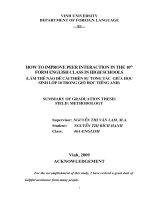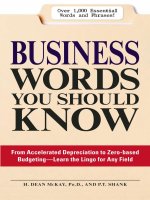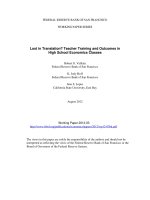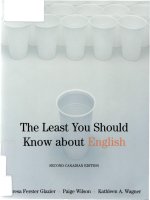Words you should know in high school
Bạn đang xem bản rút gọn của tài liệu. Xem và tải ngay bản đầy đủ của tài liệu tại đây (6.81 MB, 259 trang )
D
• Understand commonly misused words
• Learn popular definitions used in standardized tests
• Recognize the difference between synonyms and antonyms
• Perfect spelling and grammar usage
• Choose the right word for every special course and circumstance
Written in a spunky style that’s never boring, this handy book is your ticket
to a new well-spoken you—willing and able to find the right words for every
situation, at school, at work, and everywhere else!
Burton Jay Nadler is an Assistant Dean at the University of Rochester and Director of the Career
Center. He is the author of The Everything® Resume Book, 2nd Edition and The Adams College
Admissions Essay Handbook. For more than twenty years, he has shared how to best use words on
resumes and cover letters, during interviews, and through graduate and undergraduate admissions
essays. He lives in Rochester, NY.
Jordan Nadler is a member of Cornell University’s Class of 2005. At Cornell, she is
a Near Eastern Studies and Government dual major. Jordan coauthored The Adams
College Admissions Essay Handbook, sharing with her peers many of lessons she
learned as a college applicant and admissions essay writer.
Justin Nadler is a member of the Pittsford Mendon (New York) High School Class of
2005. His academic strengths include history, sports marketing, art, and Spanish.
$8.95 (CAN $10.95)
ISBN 13: 978-1-59337-294-1
ISBN 10: 1-59337-294-9
you
should
KNOW in HIGH SCHOOL
o you want to ace your SATs, write literate papers, and find the perfect
language to impress would-be bosses at job interviews? Words You
Should Know in High School helps you achieve the success you’re
looking for—one word at a time.
This easy-to-use book features more than 1,000 essential words that arm
you with the vocabulary you need to tackle real-world tasks—from debating
current events to writing essays for your college applications. Whether you’re
an incoming freshman or a graduating senior, inside these engaging and
enlightening pages, you’ll find sections that help you:
Words
Eloquence Counts!
Nadler
Reference
www.adamsmedia.com
Words
you
should
KNOW
L
in SCHOO
H
HIG
1,000 Essential Words
to Build Vocabulary,
Improve Standardized
Test Scores, and
Write Successful Papers
Burton Jay Nadler, Jordan Nadler,
and Justin Nadler
Words You Should
Know in High School
1,000 Essential Words to Build Vocabulary, Improve
Standardized Test Scores, and Write Successful Papers
Burton Jay Nadler, Jordan Nadler, and Justin Nadler
Adams Media
Avon, Massachusetts
Copyright ©2005 Burton Jay Nadler.
All rights reserved. This book, or parts thereof, may not be reproduced
in any form without permission from the publisher; exceptions are
made for brief excerpts used in published reviews.
Published by
Adams Media, an F+W Publications Company
57 Littlefield Street, Avon, MA 02322. U.S.A.
www.adamsmedia.com
ISBN 13: 978-1-59337-294-1 (paperback)
ISBN 10: 1-59337-294-9
ISBN-13: 978-1-60550-841-2 (EPUB)
Printed in Canada.
J I H G F E D C B A
Library of Congress Cataloging-in-Publication Data
Nadler, Burton Jay
Words you should know in high school /
Burton Jay Nadler, Jordan Nadler, and Justin Nadler.
p.
cm.
ISBN 1-59337-294-9
1. Vocabulary. 2. High school students—Language.
I. Nadler, Jordan. II. Nadler, Justin. III. Title.
PE1449.N3345 2005
428.1—dc22
2004026396
This publication is designed to provide accurate and authoritative information with
regard to the subject matter covered. It is sold with the understanding that the publisher is not engaged in rendering legal, accounting, or other professional advice. If
legal advice or other expert assistance is required, the services of a competent professional person should be sought.
—From a Declaration of Principles jointly adopted by a
Committee of the American Bar Association and a
Committee of Publishers and Associations
Many of the designations used by manufacturers and sellers to distinguish their
products are claimed as trademarks. Where those designations appear in this book
and Adams Media was aware of a trademark claim, the designations have been
printed in initial capital letters.
This book is available at quantity discounts for bulk purchases.
For information, please call 1-800-289-0963.
Contents
Dedication / v
Acknowledgments / vii
Introduction / ix
More Than 1,000 Words You Should Know and Use in High School / 1
Helpful Exercises for More Word Power and Better Test Scores / 213
Appendix A:
Using Roots and Prefixes to Decipher the Words You Don’t Know / 219
Appendix B:
Words of Wisdom from a High School Student,
a College Admissions Officer, and a College Student / 227
iii
Dedication
To family, friends, and faculty.
This project brought together father, son, and daughter and allowed us
to share words and pride in each other’s efforts.
The inspiration, support, and words of encouragement of our fathers,
mothers, grandfathers, grandmothers, brothers, sisters, nieces, aunts, and
uncles, during good times and bad, will forever be appreciated.
Friends, who may share few words over long periods of time, still share
memories and hopes for the future.
Faculty—whether called teachers, professors, or counselors—inspire us
all to expand our intellectual and emotional horizons and to use the right
words to express ourselves honestly and effectively.
v
Acknowledgments
Thank you! These two special words must be offered to Liz Runco, whose
efforts made much of this book possible. Also, thanks to the authors and
editors of the many, many reference books and online resources now available to inspire and support writers, students, teachers, and authors. As we
developed this work, we referred to and learned much from these wonderful
tools. We hope readers use them regularly and enthusiastically as well.
vii
Introduction
T
heodore Geisel, best known as Dr. Seuss, wrote The Cat in the Hat
after an editor challenged him to write a book that would use 250 of
the 400 words that beginning readers should know. Well, the good
doctor came very close, using 220. Later, the publisher Bennett Cerf bet
Geisel $50 that he couldn’t write a book using only fifty words. He could!
You know the children’s favorite that resulted as Green Eggs and Ham. The
$50 bet ultimately yielded the author thousands and thousands of dollars in
royalties. Using words well does pay off!
Words You Should Know in High School has some rhyming words, should
be fun and funny, and does meet a challenge, but it wasn’t written to win any
money (a rhyming sentence homage to Dr. S). It is a user-friendly reference
guide written by Burton J. Nadler in collaboration with his two children,
Justin and Jordan, who are in high school and college. In this book, you’ll
find more than 1,000 handy words and definitions that high school students
of all levels should know. Each entry features a word, its definition, and an
example of that word in a sentence. In much of its format, this book follows the example of two previous titles also published by Adams Media: The
Words You Should Know by David Olsen, and More Words You Should Know
by Michelle Bevilacqua.
A few things make this book different and just right for someone in high
school. First of all, the language here is tailored for teens, and the book is
intended to be informative, pithy, and fun to read. The varied perspectives of
the collaborators who created it should also maximize this book’s credibility
and help readers relate to its honest, friendly, and confident voices. The book
X
Words You Should Know in High School
presents the views of Justin, a high school student who is judged every day
on the words he uses, and Jordan, a college student, who can attest to how
crucial vocabulary is when seeking admissions to college and when seeking
to succeed in academics and more.
If you’re reading Words You Should Know in High School, you are most
likely a high school student interested in improving your vocabulary to get
ahead. You’re probably not seeking to become an etymologist, so your career
aspirations haven’t made you a voracious seeker of word knowledge. Okay,
so thinking about writing and speaking is definitely not as much fun as
catching a flick with friends. But words aren’t all that bad. Really! And this
book is definitely for you! You can use this book as a way to accrue a larger
vocabulary, as a study aid, or as a last-minute review handbook. You can also
use this book to help you write killer essays, when cramming for quizzes or
exams, or to enhance scores on standardized tests such as the SAT.
Words You Should Know in High School can also be used to elicit praise
from the parents of your significant other, or to wow ’em at your summer job
interview. No matter what your vocabulary needs, this book can help you
with the academic, social, and other milestone events you’ll experience in
the next few years.
The words contained in this book will help you no matter your grade
or academic level. It will help you eliminate procrastination, avoid mortification, and maximize inspiration! If you don’t know what any of the three
suffix-sharing words in the previous sentence mean, you can look them up!
As you might have guessed already, suffix, along with the other words in
bold type in the last few paragraphs, are all among those defined later in this
book. Don’t worry—if you’re not sure what they all mean right now, you will
know soon enough.
By using this book, you are preparing to take important next steps on
your path to success. The pages that follow will expand your knowledge and
help you to grow and succeed. So read on, follow the advice, and you’ll be in
for a treat! While you may not see it now, pieces of this book will travel with
you into your college years and beyond.
Now, to tell you a little more about the authors of this cool publication,
here are some brief bios:
Burt Nadler has been an Assistant Dean of the College and Director of
the Career Center at University of Rochester since 1998. Within these roles
Introduction
XI
he has been actively involved in the university’s admissions efforts and other
areas of student life. He regularly reviews and edits documents that greatly
impact students in their quest for success, including resumes, cover letters,
and graduate school personal statements.
Justin Nadler is a member of the Pittsford Mendon (New York) High
School Class of 2005. He is a proud member of the Pittsford Lacrosse Team,
as a midfielder. Justin has successfully faced many academic challenges with
determination, and he has used many resources including tutorial services
and supplementary study guides. His academic strengths include sports
marketing, art, and Spanish.
Jordan Nadler is a member of Cornell University’s Class of 2005. She
has studied at the University of London’s School of African Studies, and
she has completed the University of Dreams and the Washington Center
for Internships programs. At Cornell, she is a dual major in Near Eastern
studies and government who has earned dean’s list recognition for all academic semesters. With her father, Burt, Jordan coauthored The Adams College Admissions Essay Handbook, sharing with her peers many of the lessons
she has learned as a college applicant and an admissions essay writer.
More Than 1,000 Words You Should
Know and Use in High School
T
his list of words is offered as a reference tool that can be used as a mini
dictionary and as a guide to improving your vocabulary. As you first
read the list, see how many of the words you already know, and also
pay attention to those that seem familiar. Have you ever used any in your
essays, papers, or daily conversation? Well, you should! The more you use
new words, and the more comfortable you are expanding your vocabulary,
the better. The other results—getting better grades, impressing teachers and
adults, and achieving your goals—aren’t that bad, either.
This section is designed to be easy and enjoyable to read. The list contains
simple as well as sophisticated words, with definitions of their most common
usages. The objective of Words You Should Know in High School is first to help
you learn words you will probably find in your academic and practical reading and, second, to inspire you to use these words when writing and speaking.
Some words are tagged with mnemonic devices, which are creative statements meant to help you remember their definitions. For words that don’t
have these simple, sometimes silly, always easy-to-remember memory aids,
you may want to try to think of your own ways to remember the words. In
many cases, we also give you words with similar spelling or pronunciation,
with a clear distinction between them.
You may also want to use a highlighter as you review the list to identify new words on your list of “favorites” or those you want to use to impress
friends, family, or faculty. Also, if you are working on a writing assignment
for one of your classes, or on your college admissions essay, identify those
words that will just plain show how smart you are.
2
A
abash
abash (uh-BASH), verb
To make another feel ashamed, embarrassed, uncomfortable, or humiliated.
To make someone feel uncomfortable, including yourself, or to cause someone to lose composure. (Hey, isn’t that the definition of what people do in
junior high?)
Traditionally, high school athletes abash new team members; some call it
rookie or freshmen hazing.
abate (uh-BATE), verb
To put an end to, diminish, or reduce something in intensity. To lessen or
weaken another thing.
With a zit on your face, you may fear that your potential to date will rapidly
abate.
abdicate (AB-di-kate), verb
To formally give up a position or responsibility; commonly, refers to royalty
renouncing the throne. To step down from a high government office or other
powerful position. “You’re abdicating your responsibilities” may be a fancy
phrase you’ve heard from Mom, Dad, or the principal.
King Edward VIII, as you may know, abdicated the throne rather than give
up the woman he loved.
aberration (a-buh-RAY-shun), noun
A departure (usually temporary) from what is normal, desirable, or expected;
divergence from a moral standard; deviation from a customary, natural
course of action. Also a defect in a lens or mirror that causes a distorted
image. A fancy way to say something strange.
Justin’s one bad grade seemed to be an aberration given his history of strong
academic performance.
abet (uh-BET), verb
To assist someone in an activity that is probably illegal. To encourage or
assist with a plan or activity, as in the case of an accomplice to a robbery. Yes,
it’s easier to say help, but it doesn’t sound as impressive.
You often hear the phrase “aid and abet” on crime shows like Law and
Order.
ablution
3
abhor (ab-HORE), verb
To find something or someone loathsome, contemptible, reprehensible, or
repulsive. While it rhymes with adore, this word means quite the opposite.
Many abhor reality shows that feature plastic surgery because they find the
visual images detestable and the topic contemptible.
abide (uh-BIDE), verb
To patiently wait or tolerate. To abide is to endure; to bear or accept a person or condition; to withstand or persevere. In the old days, it meant to live
or reside in a place; one would “abide” in an “abode.” While you may abide
someone or something, you really don’t want that person or thing by your
side.
Sitters can only abide the constant whining of misbehaving children for so
long before they threaten to call their parents.
abject (AB-jekt), adjective
Allowing no hope of improvement or relief. In a state of hopelessness, destitution, or resignation. Describes the most miserable kind of situation; the
most wretched or degraded person or thing. Can also mean extremely humble, as in an apology or request. Rather than feeling pity, some might object
to an abject thing or person.
Many spring break partiers are not aware that in many Caribbean countries, abject poverty is often found side-by-side with luxury hotels, spas, and resort
properties.
abjure (ab-JOOR), verb
To renounce, repudiate, or give up one’s previously held beliefs. To solemnly
swear off or recant. Busted teens abjure (even if they don’t know it) when
they swear they’ll give up their troubled ways and be good forever.
When taking the U.S. oath of citizenship, one must abjure allegiance to any
other nation.
ablution (ah-BLOO-shun), noun
An act of ceremonial washing or cleansing, usually religious, as in a priest’s
hands during Mass. Can also refer to any cleansing, purification, or purging.
Getting pushed into the gym pool and yelling “Holy cow, that’s cold!” doesn’t
count as an ablution.
A
4
A
abnegate
abnegate (AB-ne-gate), verb
To renounce something or deny it to yourself, in particular something considered vital or important, such as food in the case of a hunger strike. To give
up, as in rights or claims.
Stephanie abnegated fried food and soda before the prom, hoping to fit into
her newly purchased dress.
aboriginal (a-buh-RIDGE-ih-nul), adjective
Indigenous or native; something that existed first, or an area’s first inhabitants. Used in reference to the Aborigines of Australia. The root “original” is
part of this word and communicates much of the meaning of “aboriginal.”
In most cases, aboriginal people sadly have little or no say in issues related to
their original homeland.
abortive (uh-BOR-tive), adjective
Failing to reach completion; unsuccessful or fruitless.
Apollo 13 was the most famous abortive mission of the U.S. space program.
abrade (uh-BRADE), verb
To wear away, rub off, or erode through friction. To break or wear down in a
spiritual sense. Over time, a wood post will abrade a braided rope.
In the past, revelations about infidelity abraded voter support for candidates,
but now such character traits don’t seem that important.
abrogate (A-bro-gate), verb
To formally (and with authority) repeal or cancel something, such as an
agreement or a contract. To take official action leading to such an end. To
abrogate a bad deal early or late is just as great.
The two business partners agreed to abrogate their contract after they discovered their venture was no longer profitable.
abscond (ab-SKOND), verb
To run away secretly, often to avoid arrest or criminal charges, and hide
yourself. Absconding with funds isn’t fun; it’s a crime, so you’ll do the time.
The plan was to rob the jewelry store, abscond to a safe location, and later
fence the goods.
accede
5
absolve (ab-ZOLV), verb
To publicly or formally pronounce someone guiltless and blameless. To
release someone from any responsibility for an alleged misdeed or, for a
priest, to forgive them of sins. When a crime is solved, some are absolved,
while the guilty parties are arrested or jailed.
Over the objections of the district attorney, the judge absolved the accused of
all charges.
abstemious (ab-STEE-me-us), adjective
Not overindulgent in food or drink; moderate in terms of consumption. The
abstemious abstain, and as a result, weigh less.
In these days of conspicuous consumption, it is harder to find individuals following an abstemious lifestyle.
abstruse (ab-STROOSE), adjective
Obscure, complex, and difficult to comprehend. Refers to something that
requires special effort to grasp. Many high school students find parents to
be abstruse.
After the first few classes, Jack thought calculus was an abstruse collection of
abstract ideas, and at the end of the semester, he realized his initial impressions
were correct.
a capella (ah kuh-PEH-la), adjective
Without accompaniment from musical instruments, usually in reference to
singing, often in a rhythmic and inventive vocal style. Don’t try out to be the
pianist for an a capella group, because you won’t get the job.
Singing groups are so popular at that college that every weekend brings at
least one a capella concert.
accede (ak-SEED), verb
To give consent or agree to something. To attain or formally accept a high
position, or to be party to an international agreement or treaty.
It is the policy of the U.S. government to never accede to the demands of terrorists.
A
6
A
accentuate
accentuate (ak-SEN-shoo-ate), verb
To make a feature of something more noticeable. To put emphasis on a syllable, word, or phrase. To strengthen or heighten the effect of something.
Comedians sometimes accentuate accents to get laughs.
The architects determined that large bay windows would accentuate the colonial style of the new home.
accolade (A-keh-lade), noun
An expression of high praise and esteem. Acknowledgement, praise, and
public recognition of an achievement.
Students who enroll in Ivy League schools usually have a history of accolades
and academic achievements.
Where’d That Word Come From?
Accolade—In medieval times, men were knighted in a ceremony
called the accolata (from the Latin ac, “at,” and collum, “neck”),
named for the hug around the neck received during the ritual,
which also included a kiss and tap of a sword on the shoulder.
From accolata, we get the English word accolade for an award or
honor.
accrue (uh-CRUE), verb
To gather over a period of time; accumulate or grow. To realize an increase
or accumulation by gradual means. A crew can accrue possessions in a week,
or maybe two.
Money held in a bank will accrue interest over time.
acquiescence (A-kwee-ESS-unce), noun
Passive agreement without objection. Assent or compliance with another’s
demands. A fancy way to say, “No problem, man.”
Being a physician requires complete acquiescence to the intellectual and emotional demands of the career, from the first day of medical school onward.
acute
7
acrid (A-krid), adjective
Strong and bitter in smell or taste. Unpleasantly pungent to the smell or
taste. Can also describe a bitter tone or harsh verbal exchange. Acid would
smell acrid, and harsh words do stink.
Her anger was released in the acrid remarks she hurled at her father.
acrimonious (a-krih-MOH-nee-us), adjective
Bitter, angry, or filled with resentment. Used to describe mean-spirited or
ill-natured language or exchanges that are filled with animosity. “Acrid” and
“acrimonious” have the same first three letters as well as similar meanings.
Acrimonious marriages cause stress and anxiety for all involved and inevitably end in divorce.
acronym (a-kroh-NIM), noun
A word that is formed from the initials or other parts of several words, such
as NATO (for “North Atlantic Treaty Organization”).
GIGO is an acronym that computer programmers created to stand for the
phrase “garbage in, garbage out.”
acrophobia (a-croh-FO-bee-a), noun
An irrational fear of high places, characterized by feelings of dread, danger,
and helplessness.
It’s almost impossible to find a roofer with acrophobia, at least one who isn’t
unemployed.
acumen (a-CUE-men), noun
Quick insight. Also, the ability to make fast, accurate evaluations or judgments about people, situations, or things.
Laurie was said to have great business acumen because every venture she
became involved in quickly turned a profit.
acute (a-CUTE), adjective
Extremely serious, painful, sharp, shrewd, perceptive, or severe. Keenly perceptive, intellectual, and sensitive to details. Also used in reference to a disease that is severe and quick to crisis.
Most teenage girls have acute skills when it comes to identifying a cute boy;
it’s like a form of radar.
A
8
A
adage
adage (A-dij), noun
A short traditional saying that expresses something accepted as a general
truth. Examples of these brief, commonly accepted expressions include “A
stitch in time saves nine” and “Actions speak louder than words.”
Though it is a cliché, athletes are fond of quoting the adage, “We’ll take one
game at a time.”
adamant (A-duh-munt), adjective
Very determined and not influenced by appeals to reconsider or change one’s
mind. Stubborn and unyielding. Most adolescents are adamant that they are
right and that everyone else, particularly parents, is WRONG!
Despite the concerns of his parents, Steve was adamant about not attending
college after graduating from high school.
addendum (a-DEN-duhm), noun
Something added, or a supplement to a book or magazine. If you are addin’
’em, it’s an addendum.
No matter how thorough the committee’s report was, someone always wanted
to suggest an addendum.
adept (a-DEPT), adjective
Highly proficient, skilled, or expert.
The league’s most valuable player was adept at hitting home runs, particularly with men on base late in the game.
ad hoc (ad HOK), adjective
Set up in response to a particular situation or problem; not focused on general issues. Formed for immediate or specific need. From the Latin meaning
“for this purpose.”
As a response to student concerns, an ad hoc committee was formed to investigate the current dress code.
ad infinitum (ad in-fi-NEYE-tum), adjective
Forever, or for so long as to seem endless. This Latin phrase translates as “to
infinity.” Can be used to describe some lectures given by parents or teachers.
After reading an initial draft of the speech, the candidate’s aide commented
that the speech rambled on ad infinitum, and so it was thoroughly edited.
akin
9
adjudicate (a-DJOO-di-cate), verb
To reach a judicial decision. To use an official procedure to hear and settle a
case, usually within a legal setting. A judge tried the case, so he could adjudicate.
Those on the Supreme Court adjudicate only the most difficult cases and only
those with constitutional implications.
adroit (a-DROIT), adjective
Endowed with physical or mental skills. Ingenious, nimble, expert, or skillful; adept at accomplishing a goal.
Michael Jordan, a supremely adroit basketball player, wasn’t nearly as skilled
when he played minor league baseball.
aesthetic (ess-THE-tik), adjective
Sensitive to or appreciative of art or beauty. Relating to aesthetics, the branch
of philosophy that examines the nature of beauty.
The aesthetic qualities of the house didn’t match the high price its sellers were
asking, for it was rather simple and unassuming.
affinity (uh-FI-nih-tee), noun
A natural attraction or inherent similarity between two people or things. To
be similar in structure or closely connected, as with ideas or concepts.
Dr. Seuss’s affinity for rhyming words resulted in much happiness for several
generations of children.
aggrandize (uh-GRAN-dize), verb
To increase the size, scope, power, wealth, status, or influence of someone
or something. To make someone or something appear bigger or better, often
through exaggerated praise. You can aggrandize a guy’s ego to a grand size.
The boxer Muhammad Ali was known to aggrandize his own abilities, just
before pulverizing his opponents.
akin (uh-KIN), adjective
Related by blood. Similar or closely related to someone or something; related
by common features or qualities. A “kin” is “akin” to a family member.
Jodi’s constant exaggerations were akin to lies, but she believed they were just
embellishments.
A
10
A
alacrity
alacrity (uh-LA-krih-tee), noun
Promptness; eager and speedy readiness. Action characterized by speed and
politeness.
Mark’s alacrity when a call came for help was always appreciated.
allay (uh-LAY), verb
To calm a strong emotion like anger, fear, or suspicion. To relieve, ease, or
reduce pain or painful feelings.
The CEO met with the entire staff to allay their fears regarding possible layoffs and firings.
allude (uh-LOOD), verb
To refer to someone or something without using a name or identification,
while still making clear who or what is being referenced. To make passing
reference. Sometimes it’s best to allude to a dude, but not use his name, for
it would be crude.
Politicians often allude to their “esteemed opponent,” and everyone knows
exactly who they mean.
altruism (AL-troo-IH-zum), noun
Behavior or attitude that is unselfish and intended for the welfare of others.
The belief that acting for the benefit of others is good.
It is very gratifying to see that wealthy individuals can display altruism as
well as business acumen.
amalgamate (uh-MAL-guh-mate), verb
To combine two or more groups into a whole, or to join multiple things
together to form a unified unit. In technical terms, to alloy or unite a metal
with mercury.
Anticipating that the two departments would soon amalgamate, the members held several strategic planning meetings.
ambiance (AWM-bee-awnce), noun
The typical atmosphere, feeling, or mood of a place.
The new restaurant became popular for its ambiance as well as for its food
and drink.
amenable
11
ambidextrous (am-bih-DEX-truss), adjective
Able to use the left or right hand with equal skill.
While it appeared she was naturally ambidextrous, her ability to shoot jump
shots with either hand came only after years of practice.
Where’d That Word Come From?
Ambidextrous—This word combines two Latin roots: ambi-,
meaning “both,” and dexter, meaning “right.” The word therefore
implies that being ambidextrous gives you two right hands, as
the right hand has long been thought to be superior to the left.
You might think of this word as the complete opposite of saying
someone has two left feet, an expression for clumsiness.
ambivalent (am-BI-vuh-lent), adjective
Uncertain, with mixed or conflicted feelings. Of two minds regarding a
potential course of action.
Although he was ambivalent about both candidates, when election day came
Gregory made his choice and cast his ballot.
amble (AM-bul), verb
To walk leisurely and slowly in a relaxed manner; to saunter or stroll.
Some tourists amble up and down the boardwalk in Atlantic City, while others remain firmly in one seat, playing blackjack.
ameliorate (uh-MEEL-yoh-rate), verb
To improve or upgrade. To make better or put right. When an unacceptable
state of affairs is changed for the better, it is said to have been ameliorated.
The marriage counselor’s attempts to ameliorate conflicts between the Smiths
were welcomed, but, unfortunately, they were not successful.
amenable (uh-MEE-nuh-bul), adjective
Agreeable to suggestions; likely to cooperate; accountable for actions. Parents and teachers would like high school students to be amenable.
Students were amenable to a new dress code if they were asked to give input
when it was being decided.
A









